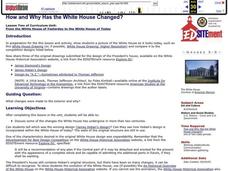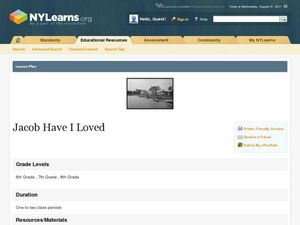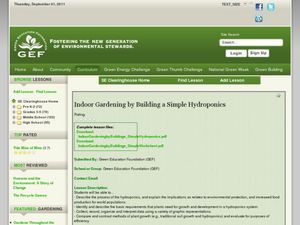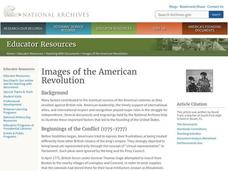University of Colorado
Spacecraft Speed
Space shuttles traveled around Earth at a speed of 17,500 miles per hour, way faster than trains, planes, or automobiles travel! In the 13th installment of 22, groups graph different speeds to show how quickly spacecraft move through...
Resource Room
Multisensory Teaching: Positive and Negative Integers
Working with thermometers, sixth graders compare the value of positive and negative numbers. Plenty of teacher suggestions and independent practice ideas are presented. This website links to two more parts in this first of three integer...
Indiana Science
How Many E’s?
Seventh graders explore random sampling by estimating the number of e's on the newspaper. They explain the possible error sources for this type of sampling, and compare the accuracy of sampling a small and large population. This is a...
EngageNY
The Pythagorean Theorem
Class members explore the estimation of irrational numbers in association with the Pythagorean Theorem. The first instructional activity of this module challenges pupils to use the Pythagorean Theorem to find unknown side lengths. When...
Science Matters
Richter Scale
The 12th lesson in a series of 20 opens with a demonstration of exponential functions using pasta. This concept is connected to the Richter Scale, which is also an exponential function. Scholars compare the exponential scale that...
Utah Education Network (UEN)
The Pasture and the Fence
Beginning geometers use tiles and grid paper to draw and calculate perimeter and area. Rectangles of different sizes are created and then measured to build understanding. The one-inch grid sheet referenced is attached.
Curated OER
Prairie Populations
Eleventh graders practice the Quadrat Survey Technique to analyze the biodiversity of a local plant community. They compare its biodiversity with the documented changes in biodiversity of the tallgrass prairie over time.
Curated OER
How and Why Has the White House Changed?
Learners examine changes the White House has undergone in the past two centuries. They view and discuss online images and designs, compare diagrams, read information from various websites, and answer discussion questions.
Curated OER
Then and Now: Life in Early America, 1740 - 1840
Students complete a unit of lessons that examine life in early America from 1740-1840. They compare items with similar objects we use today, explore various websites, create a paper doll, try and guess the function of various objects,...
Curated OER
Feelin' Buggy
Students discuss five senses, compare and contrast human and insect senses, use adjectives to describe things they touch, smell, and see, and write stories in first person describing what it would be like to be size of insect.
Curated OER
Jacob Have I Loved
Students examine visual images about the novel, Jacob Have I Loved. They compare pictures from "America from the Great Depression to World War II" that are described in the book and other studies of the Chesapeake Bay. They present their...
Ohio Department of Education
Word Origins
Understanding a word's etymology can really help with decoding and building vocabulary skills. Readers compare and contrast words of similar origins but with different difficulty levels. They focus on prefixes, suffixes, and affixes....
National Endowment for the Humanities
Walt Whitman to Langston Hughes: Poems for a Democracy
Explore the idea of democratic poetry. Upper graders read Walt Whitman, examining daguerreotypes, and compare Whitman to Langston Hughes. They describe aspects of Whitman's I Hear America Singing to Langston Hughes' Let America Be...
Curated OER
Little Red Hen Bakes Bread
Young scholars investigate the bread baking process through the use of literature. In this reading comprehension lesson, students read the book, The Little Red Hen and discuss the steps the hen followed to bake bread. Young scholars bake...
Curated OER
Indoor Gardening by Building a Simple Hydroponics
Students investigate the use of hydroponic gardening on the world food supply. In this hydroponic gardening instructional activity, students make a garden out of a soda bottle, grow a cilantro plant, and compare hydroponics with regular...
Curated OER
Hybrid Vehicles: Cut Pollution and Save Money
Math and science meet in this lesson on hybrid electric automobiles. This 24-page resource provides everything you need for teaching a lesson that compares the use of internal combustion engines to hybrid electric engines. Participants...
Curated OER
Decreasing and Increasing Fractions
Use this math lesson to help your fourth graders further their understanding of ordering fractions. After completing some whole-group activities together as a class, pairs of students play an online game which has them compare fractional...
Illustrative Mathematics
Peaches and Plums
According to the resource graph, which costs more: peaches or plums? Algebra learners compare two proportional relationships and then throw in a banana. Leaving out the scale helps students become intuitive about graphing.
media.yurisnight.net
Science Lesson Plan: Our Solar System: I Wonder?
Ever wonder why Pluto isn't considered a planet? Or how large the Earth is compared to the other inner planets? Explore the universe with a series of projects that simulate different aspects of our solar system. The activities require...
EngageNY
Margin of Error When Estimating a Population Proportion (part 1)
Use the power of mathematics to find the number of red chips in a bag — it's a little like magic! The activity asks learners to collect data to determine the percentage of red chips in a bag. They calculate the margin of error and...
Bowland
Water Availability
Just how scarce is water in different parts of the world? Through these water lessons, young data analysts use provided data to investigate the scarcity of water in countries of the Middle East and Africa. They use ratios and rates to...
Smithsonian Institution
Affirmation, Assimilation, and Acculturation: Middle School
Latin American culture is deeply embedded in American culture as a whole. From the Latin rock scene in San Francisco to the hip-hop world of New York, Latin American artists have influenced every genre of modern music. Learn about the...
NASA
Christa's Lost Lesson: Effervescence
How are chemical reactions affected by gravity? Learners explore the phenomenon of effervescence as part of the Christa's Lost Lessons series. They compare findings in an experiment on effervescence to a video of a similar experiment in...
Scholastic
Pilgrim and Wampanoag Daily Life
A lesson looks at the Pilgrims and Wampanoag tribe during the first Thanksgiving. Scholars compare and contrast information presented by an online activity then discuss their findings. Learners examine the two group's daily routines and...
Other popular searches
- Compare Numbers to 20
- Compare Numbers to 999
- Compare Numbers Lesson Plans
- Compare Numbers to 1000
- Compare Numbers 1 10
- Estimate and Compare Numbers
- Compare Numbers 1 5
- Compare Numbers 1 20
- Compare Four Digit Numbers
- Order and Compare Numbers
- Compare Numbers to 10
- Math Compare Numbers

























